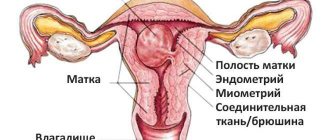In some cases, a woman taking hormonal drugs is accompanied by menstrual irregularities. One of them is heavy periods after Duphaston. To understand the cause of these processes, you need to have an idea of the composition of the product, indications for its use, as well as the effect on the menstrual cycle.
Taking Duphaston can cause heavy periods
Menstrual cycle on Duphaston
Taking this hormonal drug allows you to normalize the level of the hormone progesterone in the blood. It affects not only the possibility of achieving and maintaining pregnancy, but also maintaining the functioning of the female reproductive system. If a woman has a lack of progesterone, which affects the nature of menstruation and the possibility of natural conception, then this drug can restore the lost balance.
The onset of a new menstrual cycle, in the experience of many women, does not always follow the pattern specified in the instructions. On average, 2-7 days after finishing taking the last pill, your period should come. Their character can indicate the state of the endometrium. If a woman experiences heavy periods after Duphaston, this indicates a large amount of mucous secreted by the uterus.
The abundance and nature of menstruation after the drug Duphaston
In some cases, a woman taking hormonal drugs is accompanied by menstrual irregularities. One of them is heavy periods after Duphaston. To understand the cause of these processes, you need to have an idea of the composition of the product, indications for its use, as well as the effect on the menstrual cycle.
Taking Duphaston can cause heavy periods
What are the indications for using Duphaston?
The drug is prescribed by a qualified specialist after a thorough examination. The drug is effective for conditions during which pathological processes associated with a deficiency of the hormone progesterone occur in a woman’s body. These include:
Among the indications for the use of Duphaston are infertility diagnosed due to gestagen insufficiency. In this situation, the drug is used as an adjuvant.
What is the composition of Duphaston
The main active component of the product is dydrogesterone. One tablet of the drug contains 10 mg of this substance. Additional components of the product include:
- magnesium stearate;
- lactose monohydrate;
- hypromellose;
- silica;
- corn starch.
The composition of the tablets is quite simple
How does the drug affect menstruation?
The product is recommended for use in the second period of the cycle. This is due to the fact that during this period the hormone progesterone is intensively synthesized in the woman’s body. If there are problems with its formation, as well as the course of the menstrual cycle, the remedy is capable of these processes.
The first menstruation after a delay in most cases occurs 1-2 weeks after starting to take the drug. Copious discharge with clots is considered normal. After a few months of menstruation, women completely stabilize. Before this period during the cycle, the amount of discharge may be increased.
Restoration of menstruation processes is possible only if the drug is prescribed correctly. Duphaston is not recommended to be used independently, since self-medication can harm a woman’s health, which will lead to the development of dangerous complications and aggravate her condition.
Watch this video to learn everything about the action of this drug:
Can there be a delay after stopping the drug?
The main reason for missed periods after taking Duphaston is pregnancy. To do this, in the first days of the absence of a cycle, you need to do a test. If a negative result is obtained, the etiology of the delay may lie in other factors listed in the table.
Reason for delayMechanism of processes
| Hormonal imbalances | Duphaston affects the level of progesterone in the body of women. For this reason, it can cause hormonal imbalance. After establishing this delay factor, the doctor selects an alternative treatment tactic. |
| Late ovulation | As a result, the increase in progesterone levels in the body delays the renewal of the endometrium of the uterus. This contributes to the loss of the luteal phase. The menstrual cycle resumes 1-2 weeks after discontinuation of the drug. |
| Disorders of the functioning of the endocrine glands | The thyroid gland, adrenal glands and ovaries are most often affected. If your cycle is delayed by more than 10 days, it is recommended to contact specialized specialists for a comprehensive examination. This will help pathological processes in the early stages of development, which will allow you to prescribe the most effective treatment tactics. |
In addition, experts identify a number of other factors, in the presence of which a woman may experience delays in her menstrual cycle. These include uterine scars and impaired absorption of the active component of the drug.
Why periods can become heavy
A normal menstrual cycle in women is accompanied by the presence of a certain amount of bleeding, its characteristic color, as well as the length of time between them.
Its violations can occur due to many factors, including the use of medications. The drug Duphaston was no exception.
During its use, heavy discharge is not uncommon.
As a rule, in this case, excessive bleeding is not a pathology.
In most cases, the abundance of menstruation when using the product is not a pathology. Progesterone, which is contained in the product, helps to increase the thickness of the inner lining of the uterus. A woman needs it for a normal pregnancy.
In the absence of conception, endometrial cells are rejected. For this reason, an increase in progesterone levels contributes to an increase in the thickness of the inner layer of the uterus, which leads to an increase in the amount of discharge during the menstrual cycle.
Often, heavy periods in women after taking Duphaston are accompanied by their excessive duration. Due to the increased level of secretions, the uterus needs to be freed from them, which takes a lot of time. It is necessary to pay close attention to your body in order to exclude possible internal bleeding that may be caused by taking the drug.
In most cases, Duphaston does not play a role in heavy periods, which are accompanied by pain. Among the possible side effects of taking the drug, it is worth highlighting:
- migraine;
- dizziness;
- psycho-emotional lability;
- gastralgic symptoms;
- allergy to the components of the product.
Sometimes taking this drug causes migraines
If you notice heavy periods with clots after Duphaston, it is recommended to contact specialized specialists. They will be able to diagnose the cause of the increase in the amount of discharge, which will give a conclusion about the advisability of using the drug in the future. This will help make the treatment effective and safe for the woman’s health.
Source: https://mesyachnie.com/informacija/obilnye-posle-djufastona.html
Reason for change in allocations
If the discharge does not bother you and its amount is close to normal, then there is no reason to panic. Moreover, the duration and nature of the menstrual cycle should not undergo significant changes. However, there are a number of physiological abnormalities that cause heavy periods after Duphaston:
- Myoma, polyps in the uterus.
- Endometriosis.
- Spontaneous abortion.
- Hormonal disbalance.
In the case where the drug was prescribed to normalize the cycle, but it did not have the desired effect, it is recommended to consult a doctor about the need to replace it.
Discharge when taking Duphaston, heavy and scanty periods, reasons
Being an analogue of natural progesterone, produced naturally in the female body, it contributes to the normal course of secretory transformations in the endometrial uterine layer.
The article describes the reasons why scanty periods appear after taking Duphaston, why heavy discharge appears during menstruation after taking Duphaston, how exactly Duphaston acts on a woman’s monthly cycle, what happens in the female body after using this drug.
What is Duphaston, how does it work, how does it affect the body?
Progesterone synthesis increases during the ovulatory period, when an egg, ripe for fertilization, is released from the follicle. This hormone prepares the endometrium to accept the fertilized egg in the event of a successful conception process.
Some women, faced with irregularities in the menstrual cycle, the inability to bear a child or even conceive one, upon examination discover that progesterone is produced in insufficient quantities in their body. Often in such cases, gynecologists prescribe Duphaston, which compensates for the lack of progesterone.
The advantages of Duphaston include a minimal list of contraindications for its use, and rare side effects include the appearance of uncharacteristic discharge from the genital tract. During different phases of the menstrual cycle, some women taking this hormonal medication may experience light periods.
It is necessary to understand to what extent the vaginal discharge during the period of taking Duphaston corresponds to the norm, or whether its nature indicates certain deviations.
How does progesterone from Duphaston work?
The synthesis of progesterone in the female body occurs in the ovaries, partly in the adrenal glands. This hormone is also known as the “pregnancy hormone”, since its main functions are related to preparing the uterus for a possible pregnancy and bearing a fetus.
Important functions performed by progesterone:
- promotes the “loosening” of the endometrium, the growth of the vascular network in the uterus, so that it is easier to retain the fertilized egg and developing embryo in the event of pregnancy;
- weakens the contractility of the muscle tissue of the uterus, preventing the risk of miscarriage;
- helps block the local immune reaction, which can reject the fertilized egg;
- stimulates the development of mammary gland tissue, preparing them for the lactation period.
A sufficient level of progesterone ensures the normal course of the above processes, and also improves a woman’s mood, since it is associated with the synthesis of serotonin, called the “happiness hormone”. But insufficient production of progesterone affects the general condition of a woman, making her irritable, nervous, and prone to depression.
How do deviations manifest when taking Duphaston?
The action of progesterone is not limited to participation in the mechanism of menstruation and the normal course of pregnancy. The course of many processes in the body depends on its concentration; its influence can also affect the appearance of a woman.
The lack of this hormone provokes the onset of proliferative processes in the tissues of the uterus against the background of hyperestrogenism, and pathologies such as uterine fibroids, endometrial hyperplasia, and endometriosis develop. Progesterone deficiency disrupts the regularity of menstruation and can cause acyclic uterine bleeding.
In addition, after taking Duphaston, very scanty discharge may occur. Some patients experienced very heavy periods after taking Duphaston.
In all these cases, the wrong use or selection of the drug for the health characteristics of a particular patient is most often allowed; there is also individual intolerance to Duphaston and disruptions of the menstrual cycle, disruption of normal discharge.
Exceeding a sufficient level of the hormone, diagnosed in pathology of the adrenal glands, corpus luteum cysts, neoplasms of the appendages, leads to disorders that manifest themselves:
- rapid gain of excess body weight;
- swelling of tissues;
- the occurrence of acne;
- in excess hair growth according to the male type;
- in surges in blood pressure.
In what cases is duphaston prescribed?
Gynecologists use Duphaston:
- in case of violation of the cyclicity of menstruation;
- with amenorrhea, when menstruation is absent for several months;
- in cases of infertility;
- after spontaneous termination of pregnancy (miscarriage), repeated several times;
- for the treatment of disorders associated with heavy and painful menstruation;
- in the treatment of endometriosis pathology.
The synthetic substance dydrogesterone contained in Duphaston is an analogue of the natural hormone progesterone. The dosage regimen (duration, dose) is prescribed individually in the second phase of the cycle, taking into account the amount of progesterone determined in the patient’s blood at the time of examination.
Uncharacteristic discharge while taking Duphaston
Starting to take Duphaston may be accompanied by the appearance of spotting, which is considered a sign of physiological norm when taking hormonal drugs. This is a peculiar reaction of the body to the correction of hormonal balance, when an analogue of progesterone coming from outside increases its total concentration in the patient’s blood.
But you should pay attention to the situation when scanty menstrual flow is observed for several months in a row. The first two months are considered an adaptation period, during which the body must get used to taking the drug.
If the discharge continues longer, you must inform the doctor who prescribed Duphaston. During treatment with Duphaston, a woman's condition may be complicated by breakthrough bleeding.
It is possible that such signs are caused by the development of gynecological pathology and are not associated with taking the drug, and also signal a shift in hormonal balance, which requires separate therapy.
Sometimes the doctor hears complaints from patients about stomach pain when using Duphaston. You should not hush up the problem; you should always consult a specialist; perhaps the woman has an individual intolerance to the drug and needs to reconsider the treatment regimen.
What can cause discharge
Why does spotting brownish discharge appear while taking Duphaston, and in some cases uterine bleeding may begin? There are many reasons for this. Such deviations may be associated with an incorrect dosage regimen, when a woman independently changes the dosage regimen and single dose.
Important! Drugs whose main active ingredients are hormone analogues require strict adherence to the dosage schedule. It is not for nothing that it is recommended to take tablets regularly, at the appointed time of day, without allowing you to miss a single dose.
An irresponsible attitude to the schedule, regularity, and dosage of hormonal medications, including Duphaston, can lead to intermenstrual bleeding or the onset of uterine bleeding.
A mistake is an independent decision to start taking Duphaston on the advice of friends or acquaintances, without consulting a gynecologist.
Only a doctor can determine the correct dosage, having in hand the results of a blood test with progesterone levels and having a complete clinical picture of the patient’s health condition.
In a situation where there is a pathology of the appendages that lowers the level of estrogen, taking Duphaston can provoke an increase in the intensity of blood loss during menstruation, which is due to the resulting hormonal imbalance.
Some patients experience the phenomenon of late ovulation, when a mature egg leaves the follicle much later than on the 14-15th day of the cycle. Since Duphaston is used in the second phase of the cycle, its onset shifts with late ovulation, and if this was not taken into account, spotting may occur.
The pathology of endometriosis while taking Duphaston can cause the appearance of spotting in the period between menstruation, because this disease is characterized by the presence of endometrial foci outside the uterus.
In rare cases, the presence of discharge when taking Duphaston is associated with endocrine problems, for example, disturbances in the activity of the pituitary gland.
Discharge during pregnancy
Experience shows that such patients may develop yellowish or milky discharge from the genital tract, which is due to changes in the composition of the vaginal microflora against the background of hormonal changes in the female body during pregnancy.
Maintaining pregnancy by taking Duphaston does not completely exclude the possibility of brown or red spotting mucus, which indicates a high risk of placental abruption and the onset of spontaneous miscarriage. You should immediately report the presence of such discharge to your gynecologist so that he can adjust the dosage of Duphaston to help maintain the pregnancy.
Another situation where spotting may occur is an ectopic pregnancy. Therefore, if an ectopic pregnancy is suspected, an ultrasound scan must be performed.
The appearance of any vaginal discharge cannot be ignored; your acyclicity and intensity should be reported to the gynecologist and his further recommendations should be followed.
What to do if you have scanty or heavy periods after Duphaston?
You can prevent the occurrence of breakthrough bleeding or the appearance of brown spotting during treatment with Duphaston by taking it responsibly, without doing anything on your own. The appropriateness of use is assessed only by the treating gynecologist, and a treatment regimen and dosage are also prescribed. A woman needs:
- donate blood for hormonal indicators (estrogen, progesterone levels);
- determine the composition of the vaginal microflora to identify opportunistic agents (bacterial culture);
- examination of the pelvic organs.
Before starting to take the drug, which starts in the second phase of the cycle, it is advisable to determine the time of ovulation as accurately as possible.
This is easy to do by measuring basal temperature, which during the ovulatory period is increased, on average, to 37.3 °C.
Taking Duphaston should be started exactly at the moment of the temperature jump, remembering to follow the measurement rules (in the morning, immediately after the end of sleep) and recording the temperature readings.
The effectiveness of Duphaston has been confirmed by many specialists and patients, and to avoid unnecessary problems with its use, you must always follow the advice of experienced specialists.
Source: womanchoise.ru
- The discharge is white, bloody, brown when taking hormonal OCR. A number of contraceptive drugs are used not only to prevent unwanted pregnancy, but also to correct hormonal parameters in the event of the development of certain gynecological pathologies, for example, cystic ovarian tumors or endometriosis. Their character can...
Source: https://vpahu.com/vyideleniya-pri-prieme-dyufastona-obilnyie-i-skudnyie-mesyachnyie-prichinyi.html
What should you be wary of?
A deviation from the norm in the presence of heavy periods after Duphaston is considered if the cycle lasts less than 21 days or more than 35 days. You should also be wary of:
- Breakthrough bleeding, spotting, possibly brownish in color.
- Nagging pain in the lower abdomen, accompanied by cramps.
- Deviation from the usual duration of discharge, for example, instead of 3 days, it lasts a week or more.
- A strong odor appears from the genital tract during menstruation, and there may be greenish mucous discharge.
- The volume of blood released is more than 150 ml.
To determine the exact cause of such deviations that are atypical for a normal cycle, you must consult a doctor. It may be necessary to adjust the drug dosage regimen or discontinue it.
Start of menstruation after Duphaston
The drug Duphaston for irregular periods and other menstrual disorders is prescribed in the second phase of the cycle - from 11 to 25 days (according to other sources - from 16 days). At this time, the woman’s body compensates for the lack of progesterone. Around the 14th day of the cycle, a woman ovulates, which can last 16-32 hours. After it, active growth of the endometrium is observed. If fertilization does not occur, then it is rejected and menstruation begins. When taking Duphaston, this happens only after stopping the drug:
- Normally, menstrual bleeding begins 2-3 days after taking the last pill.
- Here it is worth taking into account the individual characteristics of women. It is not considered a pathology, even if your period came within a week. The critical period is 10 days.
- When more than 7-10 days have passed after stopping Duphaston, this is a serious deviation that requires consultation with a doctor.
When your periods are too heavy
If a woman notices that after Duphaston her periods are heavy, with clots, then it is worth eliminating the risk of bleeding. It is also accompanied by a deterioration in general health, possibly headaches and cramps in the lower abdomen. It is not recommended to take any measures on your own without consulting a doctor. It is better to call an emergency doctor at home or consult a specialist at a medical institution, since you cannot independently determine the cause of heavy periods after Duphaston, much less select the appropriate medication.
As a rule, intravenous injections of hemostatic drugs are prescribed within the walls of a hospital or in the form of tablets. As a complex therapy, it is recommended to include in the diet preparations containing vitamins such as A, C, E, B, iron, and folic acid. If you try to prescribe hemostatic drugs yourself, you can provoke the formation of blood clots.
How are Duphaston and heavy periods after taking the drug related?
The attending physician will answer the question of how Duphaston and menstruation are related. There is a lot of talk about Duphaston. Let's look at what this drug is and how it affects menstruation.
What is the drug?
Why do heavy periods occur after Duphaston? The drug contains a synthetic hormone gestagen, which replaces progesterone. It is more advanced, unlike its predecessors, and is obtained from dydrogesterone, a synthetic analogue of progesterone.
Doctors prescribe the drug for:
- menstrual irregularities;
- problem getting pregnant;
- threat of miscarriage.
[]LLpEovLV3i0[/]
Indications for use
After reading the instructions, women cannot always really understand them. Let's try to clarify the situation.
With a lack of hormones in the luteal phase. This is the phase of the menstrual cycle when ovulation occurs and the corpus luteum should begin producing progesterone. If its level is low, auxiliary drugs with this hormone are prescribed.
For endometriosis. Enlargement, proliferation of the inner layer of the uterus, due to which a woman cannot become pregnant. For infertility, if it is associated with a lack of progesterone.
If there is a threat of miscarriage. Still the same problem - progesterone deficiency. Irregular menstruation. Amenorrhea - absence of menstruation every month for several cycles in a row.
Duphaston is successfully used in gynecology.
But the drug has undesirable effects, which are indicated in the instructions and do not frighten women at all. Drowsiness, headache, uterine bleeding, which is eliminated by lowering the dose of the drug, as well as allergic reactions in the form of skin rashes.
Heavy periods after Duphaston
Until recently, medicine had its own position regarding hormonal therapy.
Hormones were used when a person’s life was at risk as a replacement treatment after organ removal, in diabetes mellitus, where the hormone is vital.
It was unacceptable for a healthy woman, without cycle disorders, who was able to get pregnant herself, to take hormones for the purpose of contraception, since the entire body system was disrupted.
As for Duphaston, we must not forget that this is a strong hormone; you should not take it just in case or to induce menstruation. It is frivolous to treat your body this way, as there is an invasion of the reproductive and endocrine system of the body.
The drug should be taken under the strict supervision of a gynecologist, especially if a woman takes it during pregnancy, when the internal organs of the child are forming, when the pregnancy is in doubt and there is a threat of miscarriage due to a lack of this hormone. Based on the results of the hormone analysis, the doctor will determine the dose of the drug that the body needs.
Many countries have abandoned the use of Duphaston. The World Health Organization (WHO) considers the effect of substitutes for this hormone on fetal development to be unproven.
Now let's talk about periods. In the ovaries of a woman in the luteal phase, i.e. after ovulation (before the onset of menstruation), progesterone and estrogen are produced - hormones that are intended for the birth of a child.
They prepare the endometrium of the uterus for conception. Estrogens develop the endometrium, and progesterone nourishes it. If pregnancy does not occur, the uterine layer is shed and bleeding begins - menstruation.
If ovulation does not occur, then there will be no luteal phase. This means that the woman will not have menstruation - there is nothing to be rejected from the uterus.
What happens in the body after taking Duphaston depends on what phase of the menstrual cycle the woman began taking the drug. If ovulation has occurred and the corpus luteum begins to produce hormones, and at this moment Duphaston is taken, considering that the level of its own progesterone is low, i.e. an external hormone must compensate for the lack of progesterone produced by the body.
In fact, when a synthetic hormone enters the body, it suppresses the production of the natural hormone. It may happen that a woman starts taking the drug not after ovulation, but on the day when it should begin or before.
In this case, the reproductive system will receive a signal that progesterone has appeared in the body, which means ovulation has occurred. As long as the woman continues to take Duphaston, new follicles will not be able to form, i.e. the ovary will not produce new eggs.
Actually, ovulation will not occur.
Now as for the periods themselves. When the menstrual cycle is disrupted and there are no periods, Duphaston is prescribed and bleeding begins.
The monthly cycle is the periodic changes that take place in a woman’s body under the influence of natural hormones produced by her body. Cycle stages:
- from the beginning of menstruation to the formation and maturation of the egg;
- release of a mature egg from the ovary - ovulation;
- the post-ovulation period, which ends with pregnancy or bleeding (menstruation).
In order for menstrual bleeding to begin, ovulation must occur first. But women don’t think about the lack of ovulation, and delays in menstruation worry many.
After the dose of Duphaston prescribed by the doctor, bleeding begins. And, it would seem, the problem is solved. In fact, the body perceives the received hormone as an outgoing signal from the corpus luteum and starts the necessary processes, i.e.
Changes occur in the endometrium that cause menstruation.
The question remains unclear: what happens in the ovary? This is the whole solution. In the ovary, the processes have been frozen and will remain so. When the drug is discontinued after several cycles of administration, bleeding may occur due to the withdrawal of Duphaston.
Duphaston does not solve the problem of ovulation. It is necessary to look for the causes of disruption of the natural menstrual cycle; they can be different and depend on individual characteristics and lifestyle.
[]AyO7PKtkv0A[/]
Introduce more brightly colored foods (yellow, red) into your diet; they will help restore the luteal phase. Relax, get rid of stress, spend money not on medicines, but on wellness treatments - swimming pool, reflexology, go to the sea or to a sanatorium.
Find a competent doctor who will help you solve both gynecological and psychological problems.
Source: https://DaoHotei.com/medicina/ginekologiya/dyufaston-i-obilnye-mesyachnye
Norm or deviation?
In the case when after Duphaston there are very heavy periods, which is not typical for a woman, then this is a deviation. The rest is considered normal, that is, when the menstrual cycle does not differ from the previous ones, in which this drug was not used. It is worth noting that not only the quantity, but also the color of the discharge can change. Many people note that the secreted blood becomes bright red. You shouldn’t be afraid of this and don’t take any special measures either.
Since very often there are reviews about the nature of the discharge after discontinuation of the drug, which becomes more abundant, it can be assumed that this phenomenon is not atypical. Therefore, you should pay attention only to those cases when, for example, for several days in a row they continue to be plentiful and you spend not 3-4 pieces a day on hygiene items, but 1.5-2 times more. This is also a reason to contact a specialist immediately.
Very heavy periods, what to do with very heavy periods with large clots
Very heavy periods are a reason to consult a gynecologist. This problem not only brings inconvenience to the woman, both financial (buying hygiene products, time off from work) and psychological, but is also harmful to health, since very heavy bleeding leads to iron deficiency anemia.
Monthly bleeding
The causes of heavy periods in most cases are gynecological pathologies. Blood loss of more than 60 grams per menstrual day is considered abnormal. In this case, if the situation repeats every cycle, the help of a doctor is necessary.
A very reliable examination is an ultrasound of the pelvic organs. The doctor looks at the thickness of the endometrium, its uniformity (whether there is hyperplasia or polyps).
Possibly large fibroids or growing into the uterine cavity.
If the cause is found, a diagnostic curettage procedure is performed, possibly using a hysteroscope to specifically remove the tumor causing severe bleeding.
Another common cause of heavy periods is adenomyosis. But you just can’t get rid of it that easily. It will bother a woman until the very end of her reproductive years, that is, until menopause, unless she starts taking hormonal contraceptives and then switches to hormone replacement therapy.
After termination of pregnancy, childbirth and diagnostic procedures
There are very heavy periods after curettage, performed for therapeutic purposes, but unsuccessfully. For example, when the goal was to remove a placental polyp from the uterus, an intervention was performed without hysteroscope control, and the polyp remained. That's why the bleeding doesn't stop.
Heavy periods after an abortion may also indicate that particles of membranes remain in the uterus. But it can also be caused by poor contractility of the uterus. More often, this problem occurs when a pregnancy is terminated at a period of 10-12 weeks, that is, at a longer stage. Doctors usually prescribe Oxytocin and a hemostatic drug, the most famous being Vikasol.
A “lazy” uterus causes very heavy periods after childbirth; it would be more correct to call it postpartum bleeding. The pathology is called subinvolution of the uterus.
A woman's postpartum discharge completely stops quite quickly, within 5-7 days, but her stomach remains large because lochia remains in the uterus.
To prevent inflammation, a drug that contracts the uterus is prescribed, and to avoid large blood loss, a hemostatic drug is prescribed. Treatment is usually carried out over five days. Against this background, antibiotic therapy is also carried out.
Contraception and hormonal treatments
Heavy bleeding is a result of using intrauterine devices. If bleeding recurs, it is recommended to remove the contraceptive and use a hormonal one, if there are no contraindications.
By the way, about hormonal drugs. Sometimes they can cause large blood losses. For example, it happens that after duphaston you have very heavy periods. This drug is designed to induce menstruation on time by eliminating progesterone deficiency. At the same time, these pills lead to an increase in thick endometrium, and as a result, more abundant menstruation.
How to help yourself with medication
There are several ways to help yourself with products that are freely sold in pharmacies. Although this does not eliminate the need to visit a doctor.
1. The old fashioned way. You can start taking nettle decoction, ascorutin and Dicinon. This is how our mothers and grandmothers stopped bleeding in Soviet times.
2. Take Tranexam. If the question arises: very heavy periods with large clots, what to do right now to get an immediate effect, then this is exactly the drug you need. Take 250 mg 3 times a day. It should be noted that blood clots present in the discharge are not a good signal and mean even more blood loss than you imagined.
3. Take painkillers. Regular Nurofen will not only relieve pain, but also reduce blood loss.
Finding a way to stop very heavy periods with clots is quite simple. But you need to keep in mind, especially if this has never happened to you before, that the cause of the pathology may be a condition that requires urgent medical intervention, including surgery. For example, ectopic pregnancy.
If serious pathologies are excluded, then it is possible to start taking oral contraceptives with levonorgestrel. They will help solve the problem of pathological menstruation.
Source: https://www.missfit.ru/woman/ochen-obilnye-mesyachnye/
Is it worth doing something?
Many people are concerned about the question: is it worth doing something about heavy periods after o? Here you need to understand what the female body secretes during menstruation. The discharge that a woman observes is the inner mucous layer of the uterus, the endometrium. When pregnancy does not occur, the uterus rejects it, and it gradually comes out through the vagina along with the blood. If the mucous layer is thin, then the discharge will be insignificant.
If a painful symptom occurs, it is recommended to take painkillers such as “No-shpy”, “Nimesil”, “Papaverine”. They can help quickly relieve muscle spasms and relieve pain. Applying a warm heating pad to your stomach and taking a warm shower (during which streams of water are directed towards the back area) also help well. You should be wary of sensations that do not stop as a result of taking these drugs. In this case, you should consult a doctor.
Does the duration of taking the drug affect the amount of discharge?
Any atypical reaction of the body to taking medications should alert a woman. This also applies to too heavy periods after Duphaston. Reviews about taking this drug are very diverse, even the opposite. When the menstrual cycle has different durations, it can be difficult to immediately understand that there is a deviation. In general, during long breaks, Duphaston is taken to shorten this time period in order to even it out to the usual 28 days.
As for the influence of the duration or duration of taking the drug on the amount of discharge, it is worth noting its positive effect. If previously your periods were scanty, then with taking this drug, on the contrary, they may become more abundant. Progesterone, which stimulates the formation of a healthy endometrial layer and is to blame.
Therefore, many are afraid of heavy periods after Duphaston. What to do in this case? Monitor your well-being; if no other symptoms bother you, then you should not take additional measures on your own.
How does Duphaston affect menstruation?
Duphaston is prescribed for use in the second phase of the menstrual cycle, to compensate for the lack of the hormone. While taking the medicine, menstruation occurs regularly and looks normal. That is, a red color and not too much discharge. Most often, Duphaston is prescribed according to a special regimen. This is how it produces a more positive effect on a woman's health.
Sometimes it happens that menstruation begins immediately after taking Duphaston. This indicates that the body is reacting to the drug. At the beginning of treatment, there may be brown discharge. You shouldn’t be afraid of this, because after a while the cycle will return to normal.











